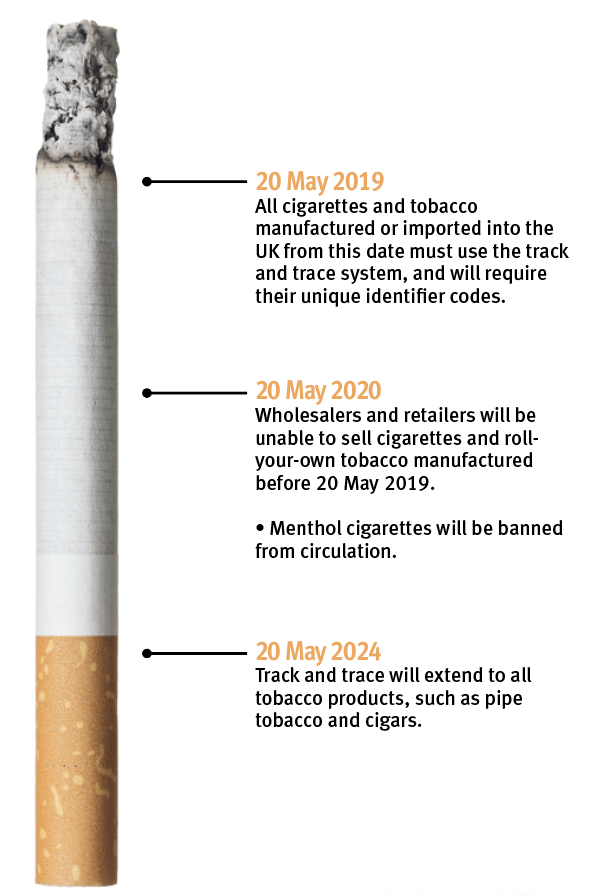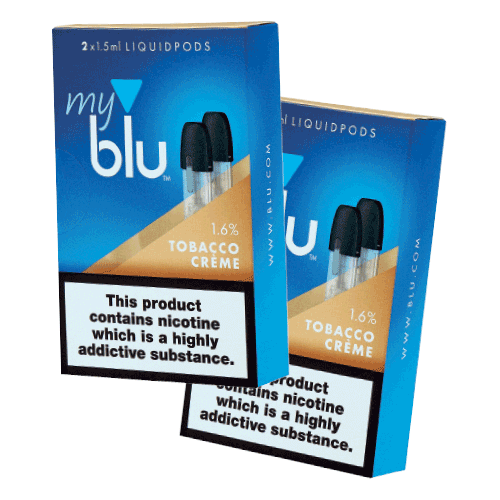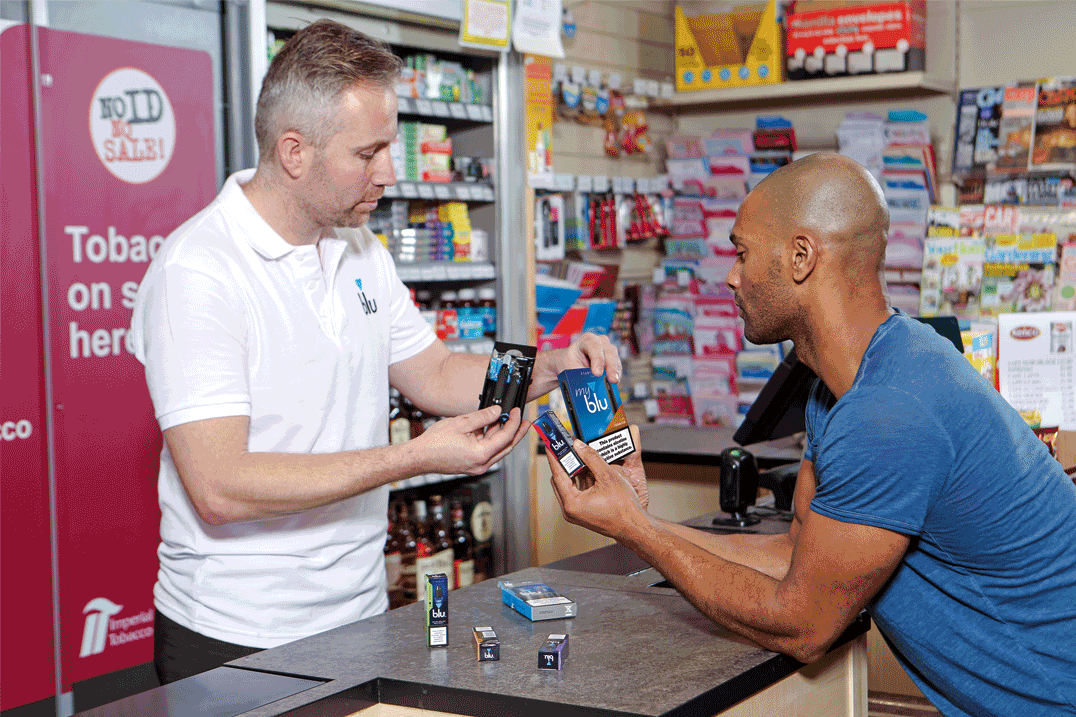Tamara Birch looks at the latest tobacco legislation, as well as the opportunities the growth in vaping presents to retailers
The next deadlines
Recent years have seen the tobacco sector become increasingly regulated, from the loss of gantry displays in stores to the enforcement of plain tobacco packaging.
The latest legislation is track and trace, designed to block the illicit tobacco trade by requiring all products to be tracked through the supply chain, and a ban on menthol cigarettes is set to come into force in May 2020.
As tobacco sales are increasingly weighed down by regulation, vaping goes from strength to strength.
The UK market is now worth £728m, with 3.2 million vapers now spending an average of £38 a month on vaping products.
Currently, category margins are between 25-30%, meaning vaping presents a huge opportunity for retailers. Significantly, while more and more limitations are placed on tobacco, the legislative situation for vaping seems more optimistic.
“Regulators and public health bodies are increasingly concluding the vaping category presents less of a risk to public health than cigarettes, and that vaping has an important role to play in
helping smokers switch to something better,” Chris Street, head of trade marketing at Blu, says.
“This includes, most recently, calls from MPs in the Science and Technology Committee for the government to relax its vaping laws and regulations, which they argued were hampering the sector – as well as highlighting that a ban on vaping in public spaces would be counterproductive for those attempting to quit smoking – with the ambition of helping more people to switch.”
Track and trace – the when, what and why?
When: 20 May 2019
What: Track and trace is the latest phase of the EUTPD II legislation. It will require manufacturers to place a unique code on all tobacco products including individual packs, outers, cases and pallets.
Why: The legislation aims to fight illicit tobacco trade by ensuring all products can be tracked throughout the supply chain.

Advise and thrive
With the cigar market in the UK currently worth £197.8 million, here’s Alastair Williams, country director at Scandinavian Tobacco Group UK (STG UK), on the importance of expertise
“In terms of advice for retailers, it’s all about education. As our research showed, shoppers want retailers to help them choose what products are right for them, especially if their usual brand isn’t in stock.
“If retailers can take the time to forge a greater understanding of the products they offer and pass this knowledge onto their staff, so they can effectively engage with shoppers, they will reap the sales rewards as a result.
“Combining insights on the cigar category and products with their knowledge of their customer base will also help retailers identify what cigars are right for them and their customer base.
“It’s important for retailers to tailor their range according to their shopper needs. Even when looking at the established value-for-money trend, this can mean different things for different people, so retailers should shape their range with their customers in mind.”
Retailer views

Todmorden News Centre,
West Yorkshire
“We will have to accept the changes, and one thing I’m unsure of is about those who sell loose tobacco. I’m not sure if they will be included as well, so we need better verification.
“I’ve not seen a lot of tobacco reps lately, so I haven’t been able to ask. The lack of capsule sales will be detrimental to retailers as a lot of our customers rely on them. Customers are getting hooked on these products and suddenly won’t be able to have them.
“I personally think it’s dangerous getting someone hooked on something then taking it away – it’s a shame we don’t have a strategy to keep them.
“It’s a tough one. The next step for our stores is to aim to push vape sales and e-cigarettes.

Diamonds, Ballymena
“I need clarification on the legislation. It’s just a bit odd that nobody knows anything.
“It seems to only affect those that break the law, I don’t think it will affect us that much. My biggest sellers are all mild cigarettes; the reason is those in duty-free aren’t stocked, so we provide something that a large company does not.”
Steeple Ashton Village Shop,
Wiltshire
“We are struggling to find information, so need some guidance, as it sounds like it will affect us in
a substantial way.
“We don’t stock any menthol products or vaping liquids. It isn’t something that’s popular where we are. We go more on customer request; as we have such a small range, we class it more as a customer service, rather than turnover and profit.
“We don’t have much information on the legislation. We don’t carry a huge line on tobacco, and if we are going to need this type of ID for sale, then we’ll need information. I get my cigarettes from Booker; what do we need to continue to purchase from wholesalers?”
Supplier view

Retail Express spoke to JTI’s head of communications, Mark Yexley, about what retailers need to do to be track and trace ready
1. Retailers will need to register for a free Economic Operator ID Code (EOID) for their business and a separate Facility ID Code (FID). They will need these codes for each of their premises where tobacco products are stored or sold.
2. Retailers must apply to government-appointed ID issuer Del La Rue to obtain the codes.
3. From 20 May, retailers will need to provide EOID and FIDs when purchasing tobacco products.
“Other than applying for codes, there will be minimal noticeable changes to retailers as a result of the legislation, and no impact on customers,” Yexley says.
Key facts on vaping
 • The UK vaping market is worth £728m
• The UK vaping market is worth £728m
• The are 3.2m vapers in the UK, spending an average of £38 per month on vape products
• Forty-six per cent of vapers also buy tobacco
• Around 8% of adults vape in the UK
• Seventy per cent of vaping sales stem from online or vape shops
• E-liquids are the driving force of sales, growing at 39%
• Current category margins are between 25% and 50%
Menthol ban is an opportunity for vaping

Chris Street, head of trade marketing at Blu, explains how the menthol ban could be an opportunity for retailers
“The upcoming ban of menthol cigarettes presents a significant opportunity for retailers – and the vaping category – as consumers continue to seek out minty flavours from other alternatives. Retailers should stock up on menthol e-liquids and Liquidpods, especially those including nicsalts like Myblu Intense, and be aware of the forthcoming changes to legislation, in order to be well positioned to help smokers switch to something better.
“While research shows that 70% of vaping sales stem from online or vape shops, there is substantial scope for retailers to reap their share of vape-related sales. The unique relationship enjoyed between convenience retailers and their loyal shoppers presents a huge opportunity for the traditional retail channel. In many instances, consumers trust and rely on advice from their local retailer regarding what products to buy, and this presents a potential competitive advantage,
especially when it comes to the vape category.
 “This relationship is particularly important when it comes to smokers looking to switch from tobacco to vaping, as – unlike online and vape stores – traditional retailers usually offer tobacco and vaping products for sale.
“This relationship is particularly important when it comes to smokers looking to switch from tobacco to vaping, as – unlike online and vape stores – traditional retailers usually offer tobacco and vaping products for sale.
“Convenience retailers can therefore play a key role in terms of category advocacy, helping adult smokers switch to something better.
“With a dizzying number of different devices and liquids now available on the market, many consumers seeking to enter the category are unsurprisingly intimidated by the sheer breadth of the vape offering. These consumers need knowledgeable advice from retailers on what to buy, along with reassurances on product quality and the benefits of switching. By taking the time to expand their understanding of the category, retailers can effectively advise these customers and grow their sales as a result.
“As well as store owners themselves, it’s vital that staff also understand not only what products they are selling, but also the customers they are selling to. Training is key to success, and by making the time and investment to educate all staff on the category, including the benefits of switching, retailers and their staff will be able to provide an exceptional level of service to customers that will encourage them to return again and again.”



Comments
This article doesn't have any comments yet, be the first!